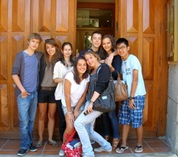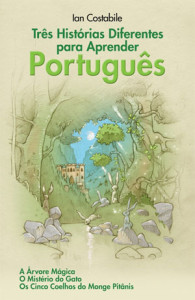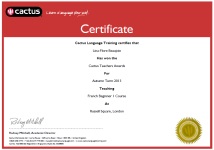School trips abroad allow students to see the useful of the language they are learning for themselves.
If there is one subject that gets a hard time in the UK, it’s modern languages. As the world becomes better at English, and British students opt for other subjects that are portrayed as more useful and appealing, once popular subjects such as French, Spanish and German are in worrying decline. Yet if there is one subject that equips students for the future, preparing them for life on the global platform and increasing their employability and earning potential, it’s – yes – languages.
With the country “producing too few young professionals with good language skills to meet the country’s needs” (Language Survey Trends 2013/2014 – British Council), the real and pressing issue today is to encourage more of our younger learners to embrace languages. Comparing Britain’s struggle to equip students with a basic level in one foreign language to the European Commission’s impressive achievement of 61% of secondary school pupils across Europe studying two foreign languages (forecast to increase to 75% by 2020) shows there is clear potential to improve second language ability in the UK.
The situation at secondary education level obviously has an impact on language learning in higher education: in 2014, not one language featured in the top 10 courses studied at university. Instead, subjects related to medicine, business studies and the fashionable creative arts hold far greater appeal to the students of today.
So what can we do to reignite the interest in second languages?
As experts in modern languages and empowered with the task of educating the next generation, we have the responsibility to show our younger learners the true value of learning a foreign language and how it can change their lives.
 One way to do this is to make language learning real. If we can take foreign language students out of the classroom and transport them to a country where the language is spoken – encouraging them to soak up the culture, explore the history and indulge in the food – it can make all the difference to their linguistic and all-round education. Indeed, in its report titled ‘Learning outside the classroom’, Ofsted identified that primary and secondary schools who take learning outside the classroom “make subjects more vivid and interesting for pupils and enhance their understanding”.
One way to do this is to make language learning real. If we can take foreign language students out of the classroom and transport them to a country where the language is spoken – encouraging them to soak up the culture, explore the history and indulge in the food – it can make all the difference to their linguistic and all-round education. Indeed, in its report titled ‘Learning outside the classroom’, Ofsted identified that primary and secondary schools who take learning outside the classroom “make subjects more vivid and interesting for pupils and enhance their understanding”.
In the case of learning a language, the benefits are manifold. Speaking the language in a real-life situation is the quickest way for any student to improve their spoken language, even if (and especially if) mistakes are made. From ordering a Fanta Limón in a café to telling your host family about your family back home, being abroad gives the impetus, need and desire to speak the target language. It’s no longer role play in class back home: these conversations have a purpose and generate a real sense of achievement.
The same Ofsted report alludes to further advantages, stating that learning outside the classroom “can also contribute significantly to pupils’ personal social and emotional development”.
And this is arguably as important as any linguistic growth. Giving young people the chance to spend time in another country, learning about another culture and customs, is giving them the gift of global knowledge. They are likely to become tolerant citizens and more accepting of other cultures in their future social and professional lives. They will also learn more about themselves, and in rising to new challenges they will gain confidence that can be transferred to many aspects of life and learning.
 A high quality language study trip will include language lessons geared to your students’ level at a local language school, to give them a solid foundation in the language, and allow them to spend the afternoons enjoying fun social, sporting and cultural activities. Safe and comfortable accommodation with carefully selected host families provides a relaxed environment in which to further practise the language and experience the culture first-hand. If your students are preparing for their GCSE Spanish or A Level German, for example, a language trip abroad will help them to progress their skills at a criticial time in their development.
A high quality language study trip will include language lessons geared to your students’ level at a local language school, to give them a solid foundation in the language, and allow them to spend the afternoons enjoying fun social, sporting and cultural activities. Safe and comfortable accommodation with carefully selected host families provides a relaxed environment in which to further practise the language and experience the culture first-hand. If your students are preparing for their GCSE Spanish or A Level German, for example, a language trip abroad will help them to progress their skills at a criticial time in their development.
The overall result is that school trips can lay strong foundations for building a positive attitude during the highly impressionable teenage years; this in turn leads to positive aspirations, enhanced relationships (with teachers, parents, the community) and improved well-being. Increased career prospects down the line are an added and significant bonus.
Learning languages through inspiring trips abroad is more relevant and necessary for our students than ever before – and the good news is, it’s easy to make this happen. Seek out a good language training company and they will be able to design a bespoke trip to match your group’s age, level and interests; organise a familiarisation trip; and visit your school to chat to teachers and parents in advance of the trip.
Let’s get our teenagers speaking more languages, both inside and outside the classroom!
 Cactus is a leading provider of language courses and specialises in arranging high quality language trips for school groups abroad. Language tuition, comfortable accommodation, stimulating activities and safety are at the heart of every trip we organise, and every trip is tailored to the needs of the group.
Cactus is a leading provider of language courses and specialises in arranging high quality language trips for school groups abroad. Language tuition, comfortable accommodation, stimulating activities and safety are at the heart of every trip we organise, and every trip is tailored to the needs of the group.
We regularly visit schools to talk to teachers, parents and students about the benefits and logistics of school group travel. www.cactuslanguage.com


















